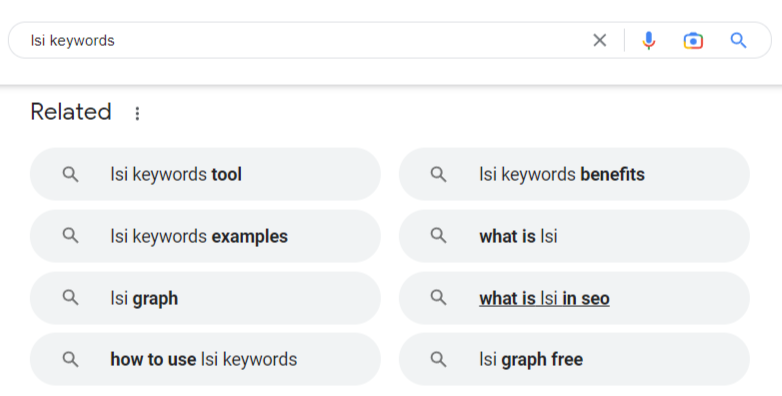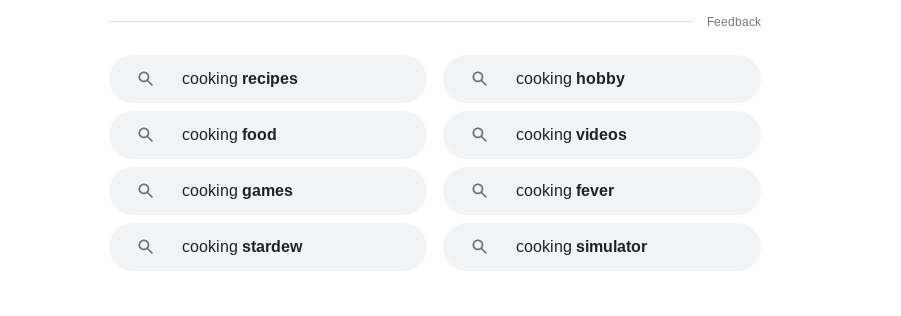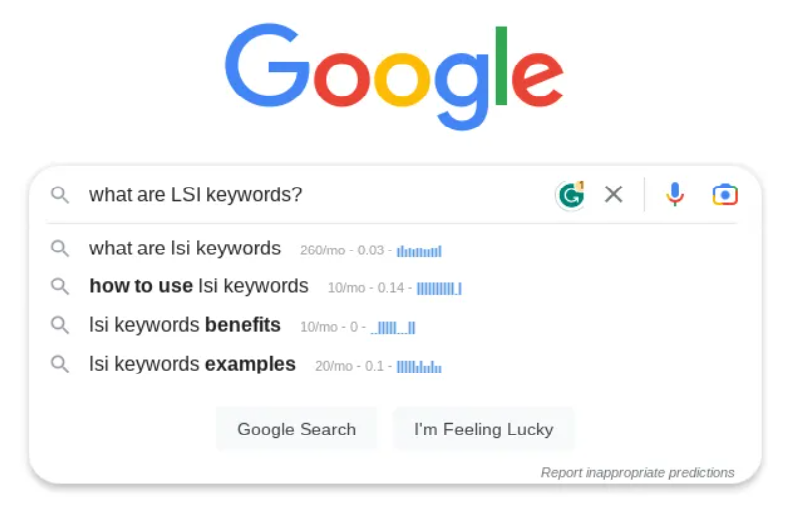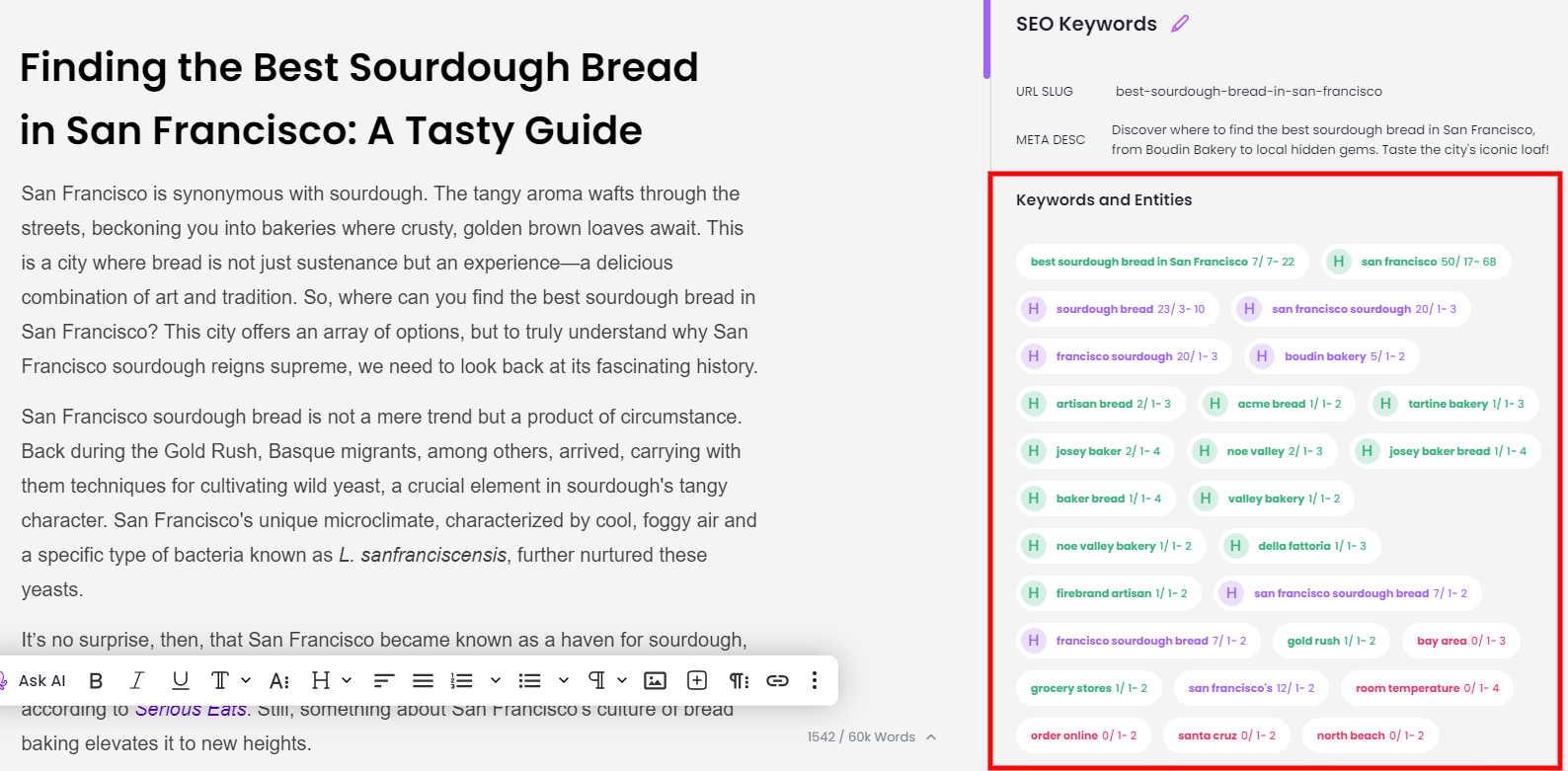So, you may have heard of a term called LSI keywords.
“What are LSI keywords?” you wonder.
A quick Google search leaves you more confused than informed. The jargon is dense, and the explanations are convoluted.
Your head spins as you try to decipher phrases like “latent semantic indexing” and “machine learning.”
Frustrated, you close your laptop.
But what if understanding LSI keywords didn’t have to be so complicated?
In this article, we’ll focus on demystifying them and answer questions that are commonly asked about LSI keywords.
First, you should know that most SEO experts don’t use the term “LSI keywords” — in fact, they’ll tell you this term doesn’t exist.
Despite that, LSI keywords have come to mean the same thing as “semantically related keywords.” People use these terms interchangeably, even if that’s technically incorrect.
The main point is that LSI keywords/semantic keywords can help your content rank better.
Of course, you should want your blog posts to rank for as many high-value keywords as possible. The return on investment from this content strategy is incredible.
After all, organic search has the power to bring in 1,000% more traffic than organic social media.
Let’s look at how LSI keywords can help.
What Are LSI Keywords?
LSI keywords are words and phrases that have a similar meaning to the main keyword of a page. They help define the topic and improve your content’s relevance for users.
Think of them as phrases or terms that are semantically linked to your primary keyword.
The idea behind LSI keywords is that they provide additional context for what your content is about, allowing search engine algorithms to deeply understand a web page and better categorize it. This ensures the web page ranks for relevant searches.
That also means identifying and finding LSI keywords and incorporating them naturally into your copy will be crucial for SEO success.
You’ll commonly find LSI keywords in the “Related” section of a Google search engine results page (SERP):

However, there is also a second meaning when we talk about LSI.
LSI (Latent Semantic Indexing), also known as LSA (Latent Semantic Analysis), was developed in 1989 as a natural language processing (NLP) technique. The technology was patented by Bell Communications Research, Inc., but the patent has since expired. This original LSI was used exclusively for documents — not for web pages — and helped identify the relationships between words.
However, somehow the term “LSI keywords” came to be associated with using related terms and synonyms to optimize content for SEO. When we talk about LSI today, that’s what most people and SEOs are referring to.
LSI Keywords vs. Synonyms: What’s the Difference?
LSI keywords aren’t necessarily synonyms, but rather words that go hand-in-hand with your main keyword. They are words people might use to describe a problem or the topic they are searching on Google.
Semantic keywords have a strong connection with your primary keyword but aren’t direct replacements for it.
For example, if you’re writing about a “car”, semantic keywords could include “vehicle”, “sedan”, and “truck” while synonyms would be words like “automobile” or “auto.”
Another example: Let’s say you’re writing a blog post about dog training tips. LSI keyword suggestions for this topic might include:
- “puppy obedience classes”
- “dog behavior modification techniques”
- “positive reinforcement dog training methods”
While both types of keywords provide context, synonyms replace your primary keyword without changing the meaning of your content, while latent semantic indexing keywords add depth by providing additional context that enriches understanding of the topic at hand.
This distinction plays a significant role in SEO because search engines value richly contextualized content over the mere repetition of exact match phrases.
Here are a few more LSI keyword examples and how they relate to a main topic:
Main Keyword: Travel
LSI Keywords:
Vacation destinations
Adventure trips
Wanderlust
Tourism trends
Backpacking tips
Hotel accommodations
Cultural experiences
Airline reviews
Travel photography
Budget travel hacks
Main Keyword: Healthy Eating
LSI Keywords:
Nutrient-rich recipes
Clean eating guidelines
Balanced meal plans
Superfoods
Plant-based diets
Cooking techniques
Weight management
Dietary supplements
Fitness and nutrition
Organic food options
Main Keyword: Technology
LSI Keywords:
Gadgets and innovations
Artificial intelligence
Cybersecurity
Tech industry trends
Software development
Data privacy
Mobile devices
Cloud computing
Virtual reality
Internet of Things (IoT)
Main Keyword: Home Decor
LSI Keywords:
Interior design inspiration
Furniture styles
DIY home projects
Color palettes
Home organization
Sustainable decor
Vintage aesthetics
Smart home technology
Feng Shui principles
Seasonal decorations
Main Keyword: Fitness
LSI Keywords:
Workout routines
Exercise equipment
Cardio vs. strength training
Healthy lifestyle habits
Gym motivation
Yoga and mindfulness
CrossFit workouts
Bodyweight exercises
Athletic wear reviews
Fitness tracking apps
Main Keyword: Personal Finance
LSI Keywords:
Budgeting strategies
Investment options
Credit score improvement
Financial planning
Retirement savings
Frugal living tips
Student loan management
Passive income ideas
Real estate investments
Emergency fund planning
Main Keyword: Sustainable Living
LSI Keywords:
Eco-friendly products
Renewable energy sources
Zero-waste lifestyle
Sustainable fashion
Green transportation
Ethical consumerism
Conservation efforts
Upcycling projects
Eco-conscious travel
Climate action initiatives
Main Keyword: Photography
LSI Keywords:
Camera reviews
Photography techniques
Photo editing software
Composition rules
Portrait photography tips
Landscape photography
Street photography
Smartphone photography
Photography gear recommendations
Photojournalism trends
Main Keyword: Career Development
LSI Keywords:
Job search strategies
Resume writing tips
Interview preparation
Professional networking
Skill development courses
Workplace communication
Leadership skills
Career growth opportunities
Remote work trends
Work-life balance
Main Keyword: Mental Health
LSI Keywords:
Stress management techniques
Mindfulness practices
Therapy options
Mental health awareness
Self-care routines
Coping mechanisms
Emotional well-being
Holistic healing approaches
Meditation and relaxation
Positive psychology
These LSI keywords can add depth and relevance to your content, making it more valuable for both readers and search engines.
LSI Keywords vs. Primary Keywords
Primary keywords are single words or short phrases that describe the main topic of a web page. Search engines use these short phrases or single words to understand the main theme of a web page and its content.
On the other hand, LSI keywords provide additional context and are more specific than regular keywords.
LSI keywords go beyond simply identifying what the page is about; they also offer information on related topics, helping search engines determine how relevant it is to certain queries.

For example, if you have an article with “cooking” as your main keyword, adding LSI terms like “recipes” or “kitchen appliances” will give readers a better idea of what type of content they can expect from your website.
Unlike regular keywords which focus on one particular subject matter, LSI keywords provide more detailed information by covering multiple aspects within that subject area. This allows search engine algorithms to make connections between different concepts when ranking pages for certain searches – something that would not be possible with just regular keywords.
Adding LSI keywords in blog posts also provides writers with an opportunity to expand on their ideas without needing to add extra words. This makes them great tools for creating concise yet informative pieces quickly.
Why Are LSI Keywords Important for On-Page SEO?
Semantically related keywords are important for on-page SEO for the following reasons:
Improved Search Engine Rankings
When you add LSI keywords (or semantically related terms) to your content, you are helping search engines understand the topic and theme of your page. When search engines recognize that your content is comprehensive and relevant, it can contribute to higher rankings in search results.
Enhanced Relevance
Semantically related words provide additional context and relevance to your main keyword so they help search engines understand the subtopics in your content. By incorporating semantically related keywords naturally within your content, you can provide a more comprehensive and valuable experience for users.
Avoiding Keyword Stuffing
In the past, some website owners would engage in keyword stuffing, which means excessively using the same keyword to manipulate search rankings. However, search engines have become more sophisticated and now penalize the practice of abusing keyword density. Semantically related words allow you to diversify the vocabulary and language used in your content, making it more natural and avoiding keyword stuffing.
Improved User Experience
LSI keywords can help you create content that is useful and informative to users. By incorporating related terms and phrases, you can provide a broader perspective on the topic, answer potential questions users may have, and address different aspects of the subject matter. This improves the overall user experience and increases the chances of engagement, which can indirectly impact your SEO efforts.
Expanded Keyword Variations
LSI keywords help you identify different variations and synonyms of your main keyword. This allows you to target a wider range of relevant search queries and attract traffic from various related keywords. By incorporating these variations naturally, you can increase the chances of your content appearing in search results for a broader set of queries.
Optimizing your pages for semantically related keywords helps Google understand not only what type of information you’re providing, but also how it relates to other topics.
Using LSI keywords can also help boost click-through rates from organic listings as they give readers more information about what the page contains before they click through to read it.
When you generate LSI keywords, don’t just throw random related terms into your text. Instead, focus on those related keywords that accurately reflect what you’re talking about.
Does Google Use LSI Technology to Index and Rank Web Pages?
Google does not use LSI technology to rank web pages.
Google simply doesn’t refer to related terms and synonyms as LSI keywords — even though that’s a popular way people refer to them in SEO.
Why? Because LSI technology was patented. When the patent expired, there was no sense in using the technology as Google had developed something better that could accomplish the same goal as LSI keywords – understanding the contextual meaning behind searches.

As a technology, Latent Semantic Analysis is not scalable and thus is unsuitable to use for a large data set that is as dynamic as the internet.
The closest thing to LSI keywords you will get with Google is “related searches” that you see at the bottom of the SERP.
Google Autocomplete is another Google feature that surfaces what can be described as LSI keywords.
Whatever you call them, LSI keywords are an important tool for optimizing content and improving on-page SEO to boost your website’s visibility and ranking.
Where Can You Find LSI Keywords?
We have already talked about Google’s Related Searches carousel and Autocomplete feature as sources of your initial LSI keyword research. But the best way to find LSI keywords related to your topic is your own deep knowledge of the subject matter.
When you become an expert on your topic, LSI keywords come to you naturally because these are words built into your expert vocabulary. This is one of the biggest advantages of writing content as an expert: the ability to use related target keywords in a natural way.
But what if you’re writing about a topic that’s outside your niche?
How do you find the best LSI keywords for your content?
While you can quickly ask ChatGPT to come up with a list of LSI keywords for you, nothing beats good old-fashioned data-driven keyword research.
Let me show you four ways to find the best LSI keywords.
1. Conduct Keyword Research
First things first: keyword research. This is where you’ll uncover the specific terms and phrases your target audience is searching for.
Identify the main keywords central to your topic and then feed them into your favorite keyword tool. Popular choices are Google Keyword Planner, Semrush, Ahrefs, and Moz Keyword Explorer.
You can also use BrandWell‘s in-app keyword research tool which uses the Mangools API to generate hundreds of keywords for your topic, and then write long-form blog posts for each of them in just one click.
As you sift through the results, look for LSI keywords that are highly relevant to your content, have decent search volume, and are easy to rank for (low ranking difficulty). These are the terms you’ll want to prioritize.
2. Use LSI Keyword Tools
To take your keyword research to the next level, you need to explore beyond the basics. That’s where tools like LSI Graph and Answer The Public come in – they’re your secret weapons for finding those all-important semantic keywords.
With your main keyword in hand, these tools go to work generating a list of related terms and questions that help you pinpoint relevant LSI keywords to incorporate into your content.
3. Analyze Search Intent
Another important factor to consider when choosing LSI keywords is search intent. In other words, what is the user looking for when they type a query into Google?
Are they searching for information, a specific product, or a solution to a problem?
Understanding the intent behind the keywords can help you create content that better meets the needs of your audience.
4. Identify Keyword Variations
Finally, don’t forget to look for variations of your main keyword to use as LSI keywords. This can include synonyms, long-tail phrases, and even questions related to your topic.
For example, if your main keyword is “content marketing”, some good LSI keywords might be “content strategy”, “blogging tips”, or “how to create engaging content”.
By incorporating a mix of main keywords and related variations, you can create well-rounded, semantically rich content that both search engines and readers will love.
Pro tip: When optimizing blog posts generated using the RankWell AI SEO writer, there’s no need to fire up an LSI generator in a separate tab to find related keywords to add to your article. To your right is an Optimization tab that lists LSI and other specific keywords the AI has already researched for you.

Each keyword or entity is color-coded: red means there is no mention of that keyword in the article, yellow means you have used the keyword but can add in more, green means the keyword is optimized, and white means you’ve overstuffed the blog post with this keyword.
To the right of the keyword is a range of the ideal number of times you should use the keyword in your content.
How to Use LSI Keywords for SEO
You’ve done your research and found a solid list of LSI keywords. Now it’s time to use them in your content. But how do you do it effectively?
Incorporate LSI Keywords Naturally
The most important thing to remember when using LSI keywords is to incorporate them naturally. You never want to force keywords into your content just for the sake of SEO.
Instead, use them where they logically fit and enhance the quality of your writing. A good rule of thumb is to mention your primary keyword a few times throughout the body content where they are relevant. This will help Google understand the context of your content and avoid any issues with keyword stuffing.
Optimize Title Tags and Meta Descriptions
In addition to the body of your content, LSI keywords can also be used in your title tags and meta descriptions. These are the snippets of text that appear in search results and give users a preview of what your page is about.
By including relevant LSI keywords in these elements, you can help search engines and users better understand what your content is about and improve your click-through rates from search results.
Just remember to keep your title tags and meta descriptions concise and compelling. You want to entice users to click through to your site, not overwhelm them with a list of keywords.
Add LSI Keywords to Headings and Subheadings
Another great place to use LSI keywords is in your headings and subheadings. Not only does this help break up your content and make it easier to read, but it also gives search engines important clues about the main topics covered on your page.
When crafting your headings, try to include your main keyword in the H1 tag and use relevant LSI keywords in your H2 and H3 subheadings. This helps create a clear hierarchy and structure for your content.
By using LSI keywords in your headings, you can help Google scan and understand your content more effectively, improving your chances of ranking for relevant search terms.
Balance Keyword Density
Finally, let’s talk about keyword density. This refers to the number of times a keyword appears in relation to the total word count of a page.
While there’s no magic number, a good general guideline is to aim for a keyword density of around 1%. This means if your article is 1,000 words, your primary keyword should appear roughly 10 times.
Remember, the goal is to create valuable, engaging content for your readers first and foremost. Use LSI keywords to enhance the relevance and context of your content, but never sacrifice quality just to get 20 mentions of your main keyword in there.
Read More: How Many SEO Keywords Per Page Should You Target?
How to Incorporate LSI Keywords Within Blog Posts
When writing blog posts, it is important to include both regular and LSI keywords. Find related keywords and phrases that provide context for your content. They can be synonyms or terms related to your topic that can help search engines understand what your post is about.
So how do you optimize your blog posts with long-tail LSI keywords to boost their visibility in search engine results?
Use Natural Language
Using natural language when incorporating LSI keywords into your post is key. It helps ensure that the content reads smoothly and makes sense to readers.
For example, if you’re writing a post about SEO best practices, you could use “search engine optimization” as well as “SEO” interchangeably throughout the text instead of just one term exclusively.
This provides more context for search engines and makes your sentences less repetitive and thus easier to read.
Sprinkle LSI Keywords in Key Places
Don’t just add synonyms and related terms to the body of your article. Here are some key places where you can and should use LSI keywords:
- Page title
- Meta description
- Headings
- Link anchor text
- Image alt tags
Particularly, optimizing page titles and meta descriptions is key for search engines to have a better understanding of what the topic entails, potentially leading to higher SERP rankings.
Mastering the skill of finding and integrating LSI keywords into content is an intricate task, but with a bit of practice, you’ll soon be able to strike an ideal balance between SEO objectives and user engagement.
Fact: Google values high-quality content that provides valuable insights to users.
The more comprehensive your content is, the better your chances of improving rankings.
And this isn’t just a baseless claim – it’s a well-established fact supported by numerous studies.
Common Mistakes to Avoid When Using LSI Keywords
While using LSI keywords can be an SEO game-changer, they can also tank your efforts if done incorrectly.
Let’s explore the top mistakes to avoid to get your strategy back on track.
Overusing LSI Keywords
One of the biggest mistakes people make is overusing their LSI keywords — or keyword stuffing — which is a big no-no in the eyes of Google.
When you’re writing content, it’s essential to strike a balance between providing context with LSI keywords and overwhelming your readers.
Overstuffing your content with keywords can lead to a terrible reading experience and even get you penalized by Google.
Neglecting User Experience
Another mistake is focusing so much on LSI keywords that you forget about the user experience.
Yes, LSI keywords are important for SEO, but they shouldn’t come at the expense of your readers.
Quality trumps quantity when it comes to crafting content. If you’re stuffing your writing with keywords at the expense of clarity and coherence, you’re heading in the wrong direction.
Focusing on Irrelevant Keywords
It’s also important to make sure the LSI keywords you’re using are actually relevant to your content. Just because a keyword is related to your main topic doesn’t mean it belongs in your article.
Stick to closely related keywords and provide additional context. Using irrelevant keywords will only confuse your readers and hurt your on-page SEO.
Ignoring Content Quality
Don’t fall into the trap of thinking LSI keywords are the sole solution to improving your search engine rankings. While they’re crucial, they’re not a magic bullet that’ll skyrocket you to the top.
At the end of the day, the quality of your content is what matters most. Focus on creating high-quality, informative, and engaging content that provides real value to your audience. Use LSI keywords to support and enhance that content, not replace it.
Measuring the Impact of LSI Keywords on Your SEO
So you’ve started using LSI keywords in your content, but how do you know if it’s actually making a difference?
Here are a few ways to measure the impact of LSI keywords on your SEO.
Track Keyword Rankings
One of the first things you should do is track your keyword rankings for both your main keyword and your LSI keywords. Use tools like Google Search Console to monitor your rankings over time.
If you see your rankings improving for your LSI keywords, that’s a good sign that your efforts are paying off.
Keep an eye on your main keyword as well to see if it’s benefiting from the additional context provided by your LSI keywords.
Analyze Traffic and Engagement Metrics
Your website’s traffic and engagement metrics can tell a story. Has the addition of LSI keywords led to a significant increase in organic traffic?
Paying attention to user behavior can reveal a lot about the effectiveness of your LSI keywords.
For instance, if users are spending more time on your site, and bounce rates are decreasing, it could be a sign that your keywords are helping search engines and users better understand your content.
Monitor SERP Features
In addition to tracking your keyword rankings, keep an eye on your visibility in various SERP features like featured snippets and “People Also Ask” boxes.
Conduct Regular Content Audits
To get the most out of your LSI keywords, make regular check-ins a priority. Identify the top-performing pages and dissect the LSI keywords that make them shine.
Tweak your LSI keyword strategy by mining these insights and revamping underperforming content.
Advanced Strategies for Optimizing Your Content with LSI Keywords
If you really want to take your LSI keyword game to the next level, there are a few advanced strategies you can try.
Here’s how to use LSI keywords like a pro:
First, consider using LSI keywords in your internal linking structure. When you link to other pages on your site, use descriptive anchor text that includes relevant LSI keywords. This helps Google understand the context and relationship between your pages.
To give search engines a better grip on your content, try slipping in some schema markup. This semantic trick lets you label the essential details — content type, author, publication date, and more — so search engines can give your page the love it deserves.
If you want to establish yourself as an expert in your field, try grouping related content around your main topics and LSI keywords. This clustering effect can boost your search visibility and cement your authority on the subject.
Now, I know some of this might sound complicated, but don’t worry. BrandWell makes it easy to build topic clusters through its keyword research tool as it automatically groups related keywords together and creates content around them. All you have to do is add anchor text and internal links.
The secret to SEO success lies in combining forces. LSI keywords are just one piece of the puzzle – you need to amplify their power by optimizing your title tags, structuring your content with header tags, and establishing a robust network of high-quality backlinks.
FAQs – What Are LSI Keywords?
How do I use LSI keywords?
Use LSI keywords liberally in your blog posts. The idea is to use an LSI keyword where you would have used your target keyword. This improves your content by preventing the overuse of your primary keyword and helps make it accessible to more readers. Add them to the metadata, headers, and body text.
How do I choose LSI keywords?
Start by researching and understanding your topic using LSI keyword tools. Research other sources related to your topics such as industry publications, forums, blogs, and competitor keywords for potential LSI terms. Choose those that make the most sense for your content marketing strategy and SEO objectives.
What is the difference between secondary and LSI keywords?
LSI keywords are secondary keywords in the sense that they are not the primary target for your on-page optimization. That said, not all secondary keywords can be LSI keywords.
LSI keywords are secondary keywords that mean the same thing as the primary keyword. Other secondary keywords may mean something different than the primary keyword, only that they have to be topically relevant and expand understanding of the primary keyword.
Conclusion
So what are LSI keywords and why are they important?
LSI stands for Latent Semantic Indexing. They differ from regular keywords in that they provide more context to search engines by adding related words or phrases.
LSI keywords are an important tool for on-page SEO and can help improve the quality of your content. By using LSI keywords, you can make sure Google knows exactly what your page is about without having to rely solely on exact match keywords. This will help ensure that your content gets seen by more people and ranks higher in organic searches.
When used correctly, LSI keywords can make a blog post stand out and increase its chances of being found through organic searches. With proper keyword research, it’s possible to find the right combination of LSI keywords that will optimize your content for maximum visibility online.
RankWell takes the guesswork out of researching LSI keywords for your blog posts. Each article generated by the app includes a list of keywords and entities with a corresponding number of times that each phrase should appear in your article. All you have to do is add them naturally throughout your content and watch your SEO score soar!




